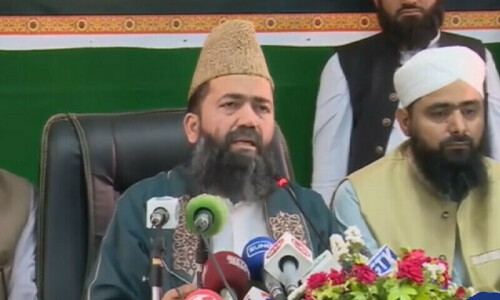HYDERABAD: Speakers at a seminar have said that climate and weather conditions in Sindh are making the situation, especially Kotri barrage downstream, highly vulnerable and may lead to drought across the province.
They said at the moot titled “Climate impact assessment on biodiversity of Indus River Kotri downstream to delta region” organised by Zoology department, University of Sindh, on Wednesday that necessary steps should be taken to safeguard natural biodiversity of Kotri downstream and Indus delta.
They said that if conditions persisted for some years, Sindh would become a deserted land and fauna, aquatic and terrestrial life would suffer great harm.
Prof Dr Agha Asad Noor, dean of Faculty of Natural Sciences who chaired the seminar on behalf of vice chancellor, discussed critical challenges posed by climate change to biodiversity hotspot of Kotri downstream.
He said that situation in the Indus could lead to calamities across Sindh and urged authorities to understand grave concern of researchers and protect Indus delta. He warned of desertification if conditions persisted for some more years.
Dr Ghulam Sarwar Ghachal highlighted the issue of shrinking fauna and devastating impact of extreme droughts and floods on wildlife habitats and advocated declaration of Indus River Kotri downstream as protected and sustainable ecological zone with adequate water supply for its preservation.
Centre for Coastal and Deltaic Studies director Dr Mukhtar Ahmed Mahar underscored vital role of freshwater influx into Kotri downstream for sustaining both aquatic and terrestrial life.
He said that collaborative efforts were needed by research scholars, civil society and departments concerned to safeguard natural biodiversity of Kotri downstream and delta.
Zoology department’s chairperson Prof Dr Naheed Kaka urged research scholars to focus on applied research that directly benefited natural biodiversity. She pointed out crucial role of maintaining natural food chains and ecological balance to mitigate atmospheric disasters.
Prof Dr Manan Sheikh of Government College University shed light on challenges posed by floods, rains and droughts to deltaic eco-region and called for pivotal role of academic research in providing tangible results for fauna and flora conservation.
A seminar by PhD scholar Dhani Bux Mashori was also held on the sidelines of the main event in which he presented compelling findings from his doctoral thesis, highlighting degradation of water quality in Indus River due to decayed plants, eutrophication and toxic algal blooms.
The faculty members, research scholars, civil society representatives and government officials, who also participated in the moot, called for action and said collaborative efforts and sustainable practices were required to preserve biodiversity of Indus River Kotri barrage downstream.
Published in Dawn, March 28th, 2024











































Dear visitor, the comments section is undergoing an overhaul and will return soon.